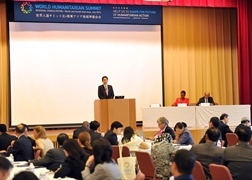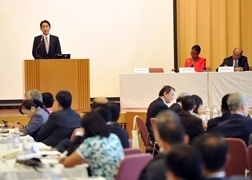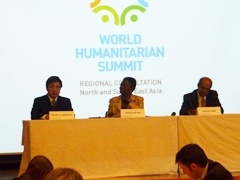Countries & Regions
World Humanitarian Summit North and South-East Asia Regional Consultation



On July 23 and 24, the World Humanitarian Summit North and South-East Asia Regional Consultation was held at Mita Kaigisho, Tokyo. The overview of the Consultation is as follows.
1. The Regional Consultation was organized jointly by the Government of Japan, United Nations Office for the Coordination of Humanitarian Affairs (OCHA) and the Government of Indonesia. The meeting was attended by the government officials including Minister for Foreign Affairs Fumio Kishida from Japan, and by Ms. Valerie Amos, UN Under-Secretary-General for Humanitarian Affairs and Emergency Relief Coordinator from OCHA, as well as approximately 140 participants comprising government officials, NGOs, academics and private sector representatives from North and South-East Asia. The participants discussed future approaches to cooperation taking into consideration the changing environment surrounding humanitarian assistance, such as the diversified actors engaging in humanitarian assistance (emerging donors and the private sector), the expanded roles governments of disaster-affected countries are expected to play, and development of new technology.
2. At the start of the Consultation, Foreign Minister Kishida stated that Japan learned many lessons from the Great East Japan Earthquake. He said Japan will promote the inclusion of gender perspectives as well as mainstreaming disaster risk reduction through variouspost-2015 processes, including the Third World Conference on Disaster Risk Reduction to be held in Sendai City in March next year and the World Humanitarian Summit. Additionally, Foreign Minister Kishida said he expects to see meaningful input from North and South-East Asian region toward a successful World Humanitarian Summit in 2016 as well as Regional Consultations to be held in each region in the run up to the Summit itself.
3. The focus of this Consultation was on (1) Humanitarian Effectiveness, (2) Reducing Vulnerability and Managing Risk, (3) Transformation through Innovation, and (4) Serving the Needs of People in Conflict, which were the main themes of the World Humanitarian Summit, and these points were actively discussed at the Consultation. These points were actively discussed, and the Consultation ended following the issuance of the Co-Chairs’ summary (English (PDF) ).
).


